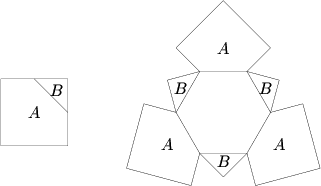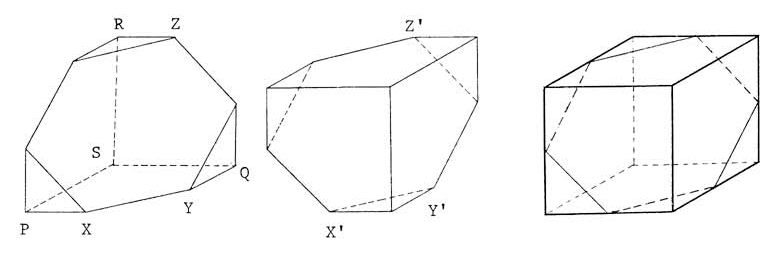1985 AIME Problems/Problem 15
Problem
Three 12 cm ![]() 12 cm squares are each cut into two pieces
12 cm squares are each cut into two pieces ![]() and
and ![]() , as shown in the first figure below, by joining the midpoints of two adjacent sides. These six pieces are then attached to a regular hexagon, as shown in the second figure, so as to fold into a polyhedron. What is the volume (in
, as shown in the first figure below, by joining the midpoints of two adjacent sides. These six pieces are then attached to a regular hexagon, as shown in the second figure, so as to fold into a polyhedron. What is the volume (in ![]() ) of this polyhedron?
) of this polyhedron?
Solution 1 (nice and beautiful)
Note that gluing two of the given polyhedra together along a hexagonal face (rotated ![]() from each other) yields a cube, so the volume is
from each other) yields a cube, so the volume is ![]() , so our answer is
, so our answer is ![]() .
.
Solution 2
Taking a reference to the above left diagram, obviously SP, SQ and SR are perpendicular to each other. Thus expanding plane SPQ, SQR and SRP to intersect with the plane XYZ that contains the regular hexagon, we form a pyramid with S the top vertex and the base being an equilateral triangle with side length of 18 ![]() . This pyramid has a volume of 972, because it is also 1/6 of the volume of a cube with side length of 18. Then subtracting 3 congruent pyramids with volume of 36 each, we get
. This pyramid has a volume of 972, because it is also 1/6 of the volume of a cube with side length of 18. Then subtracting 3 congruent pyramids with volume of 36 each, we get ![]() .
.
See also
| 1985 AIME (Problems • Answer Key • Resources) | ||
| Preceded by Problem 14 |
Followed by Last Question | |
| 1 • 2 • 3 • 4 • 5 • 6 • 7 • 8 • 9 • 10 • 11 • 12 • 13 • 14 • 15 | ||
| All AIME Problems and Solutions | ||











